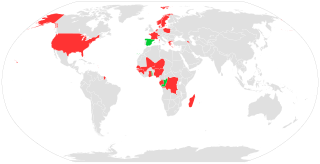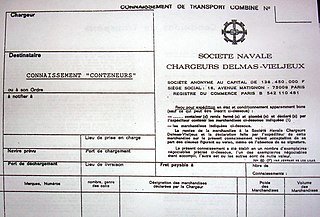A waybill is a document issued by a carrier giving details and instructions relating to the shipment of a consignment of cargo. Typically it will show the names of the consignor and consignee, the point of origin of the consignment, its destination, and route. Most freight forwarders and trucking companies use an in-house waybill called a house bill. These typically contain "conditions of contract of carriage" terms on the back of the form that cover limits to liability and other terms and conditions.
Protection and indemnity insurance, more commonly known as P&I insurance, is a form of mutual maritime insurance provided by a P&I club. Whereas a marine insurance company provides "hull and machinery" cover for shipowners, and cargo cover for cargo owners, a P&I club provides cover for open-ended risks that traditional insurers are reluctant to insure. Typical P&I cover includes: a carrier's third-party risks for damage caused to cargo during carriage; war risks; and risks of environmental damage such as oil spills and pollution. In the UK, both traditional underwriters and P&I clubs are subject to the Marine Insurance Act 1906.
In a contract of carriage, the consignee is the entity who is financially responsible for the receipt of a shipment. Generally, but not always, the consignee is the same as the receiver.
A charterparty is a maritime contract between a shipowner and a "charterer" for the hire of either a ship for the carriage of passengers or cargo, or a yacht for leisure.
The Carriage of Goods by Sea Act ("COGSA") is a United States statute governing the rights and responsibilities between shippers of cargo and ship-owners regarding ocean shipments to and from the United States. It is the U.S. enactment of the International Convention Regarding Bills of Lading, commonly known as the "Hague Rules". It was found in Title 46 Appendix of the United States Code, starting at Section 1301, but has been moved to a note in 46 United States Code 30701.

Vita Food Products Inc v Unus Shipping Co Ltd [1939] UKPC 7, is a leading decision of the Judicial Committee of the Privy Council on the conflict of laws. The case stands for the proposition that an express choice of law clause in a contract should be honoured as long as the agreement was bona fide and not against public policy. The case is significant in the field of contract law, as it greatly expanded the ability of parties to choose the jurisdiction of their contacts.
The Hague–Visby Rules is a set of international rules for the international carriage of goods by sea. They are a slightly updated version of the original Hague Rules which were drafted in Brussels in 1924.
The Hague Rules of 1924 is an international convention to impose minimum standards upon commercial carriers of goods by sea. Previously, only the common law provided protection to cargo-owners; but the Hague Rules should not be seen as a "consumers' charter" for shippers because the 1924 Convention actually favoured carriers and reduced their obligations to shippers.
Affreightment is a legal term relating to shipping.

The Aramis [1989] 1 Lloyd’s Rep 213 is an English case, relevant for the concept of an implied contract.

The "Rotterdam Rules" is a treaty proposing new international rules to revise the legal framework for maritime affreightment and carriage of goods by sea. The Rules primarily address the legal relationship between carriers and cargo-owners.

The doctrine of deviation is a particular aspect of contracts of carriage of goods by sea. A deviation is a departure from the "agreed route" or the "usual route", and it can amount to a serious breach of contract.

The Carriage of Goods By Sea Act 1992 is a UK Statute regarding bills for the lading of goods onto ships. It repealed the Bills of Lading Act 1855 and made new provisions.

A bill of lading is a document issued by a carrier to acknowledge receipt of cargo for shipment. Although the term is historically related only to carriage by sea, a bill of lading may today be used for any type of carriage of goods. Bills of lading are one of three crucial documents used in international trade to ensure that exporters receive payment and importers receive the merchandise. The other two documents are a policy of insurance and an invoice. Whereas a bill of lading is negotiable, both a policy and an invoice are assignable. In international trade outside the United States, bills of lading are distinct from waybills in that the latter are not transferable and do not confer title. Nevertheless, the UK Carriage of Goods by Sea Act 1992 grants "all rights of suit under the contract of carriage" to the lawful holder of a bill of lading, or to the consignee under a sea waybill or a ship's delivery order.
Norfolk Southern Ry. v. James N. Kirby, Pty Ltd., 543 U.S. 14 (2004), was a United States Supreme Court case that dealt with the extent to which maritime bills of lading cover non-maritime portions of a shipment, together with connected clauses for exclusion of liability.
A freight claim or cargo claim is a legal demand by a shipper or consignee against a carrier in respect of damage to a shipment, or loss thereof.
Seaworthiness is a concept that runs through maritime law in at least four contractual relationships. In a marine insurance voyage policy, the assured warrants that the vessel is seaworthy. A carrier of goods by sea owes a duty to a shipper of cargo that the vessel is seaworthy at the start of the voyage. A shipowner warrants to a charterer that the vessel under charter is seaworthy; and similarly, a shipbuilder warrants that the vessel under construction will be seaworthy.
The law of carriage of goods by sea is a body of law that governs the rights and duties of shippers, carriers and consignees of marine cargo.
Grant v Norway (1851) is a case on the Law of Carriage of Goods by Sea; but since 1992 it has no longer been good law.

Leduc v Ward is a leading English case on deviation within the law of carriage of goods by sea. The case also addresses bills of lading, and the parol evidence rule.






